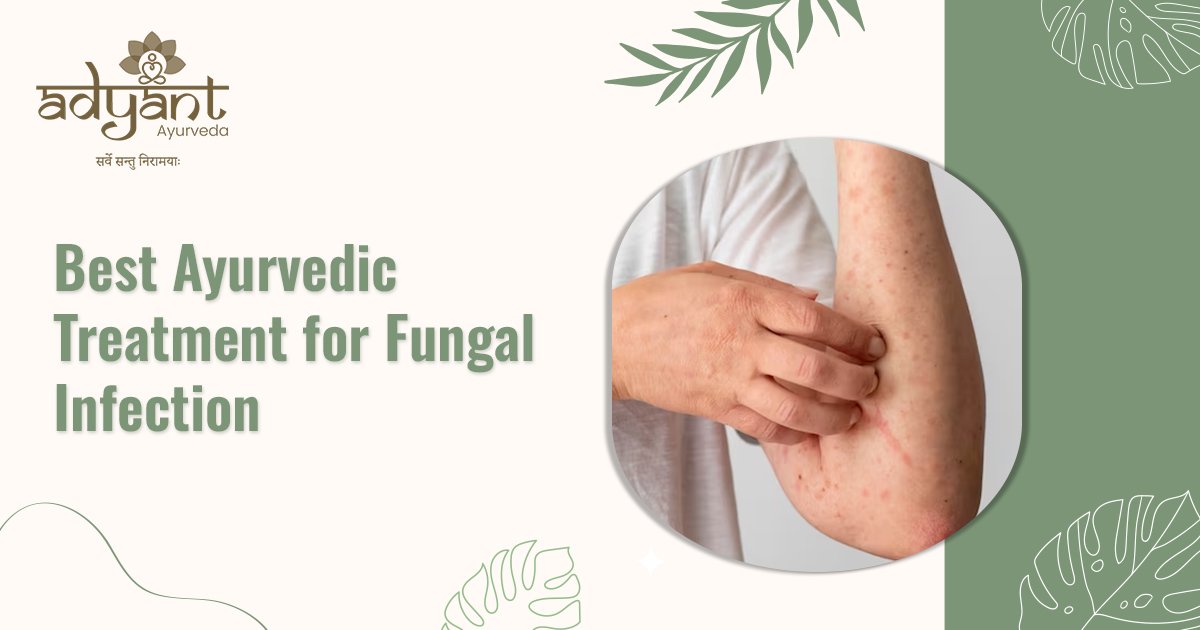Table of Contents
Toggle
Best Ayurvedic Treatment for Fungal Infection: It is also known as Mycosis. Fungal infections are a common health concern affecting millions worldwide. Studies show that over 1 billion people suffer from fungal infections annually, with skin, nail, and respiratory infections being the most common [Source: CDC]. While antifungal creams and medications offer temporary relief, they often fail to address the root cause, leading to recurrent infections.
At Adyant Ayurveda, we specialize in treating fungal infections using a comprehensive approach that not only eliminates symptoms but also addresses the root cause. This article explores Ayurvedic treatments, home remedies, and lifestyle modifications to prevent and manage fungal infections naturally.
For a free consultation with top ayurvedic doctors for Fungal Infections Ayurvedic Treatment, download our app from Play Store “AyurCare“
Understanding Fungal Infections in Ayurveda
Fungal infections result from the overgrowth of fungi in the body, often thriving in warm and moist environments. Common types include ringworm, athlete’s foot, candidiasis, and nail fungus.
According to Ayurveda, fungal infections arise due to an imbalance in the doshas—Vata, Pitta, and Kapha:
- Vata Imbalance: Causes dryness, cracking, and itching.
- Pitta Imbalance: Leads to inflammation, redness, and burning sensations.
- Kapha Imbalance: Results in excessive moisture, stickiness, and slow healing.
Ayurvedic treatments focus on restoring balance to these doshas through detoxification, herbal remedies, and dietary modifications.
You May Also Like: Ayurveda Doshas – The Complete Guide
Ayurvedic Treatment for Fungal Infections
At Adyant Ayurveda, we employ a multi-dimensional approach to treat fungal infections:
- Panchakarma Therapy – A detoxification process to cleanse the body of accumulated toxins.
- Herbal Formulations – Personalized herbal medicines to combat fungal overgrowth and boost immunity.
- External Applications – Medicated oils, pastes, and decoctions for topical relief.
- Dietary & Lifestyle Modifications – Recommendations to prevent recurrence and enhance overall health.
Powerful Ayurvedic Herbs for Fungal Infections
Ayurveda relies on potent herbs with antifungal properties. Here we are listing 7 Ayurvedic Herbs that are very effective if want to do Ayurvedic Treatment for fungal infections:
- Neem (Azadirachta indica) – A natural antifungal that purifies the blood and skin.
- Turmeric (Curcuma longa) – Contains curcumin, known for its anti-inflammatory and antifungal effects.
- Aloe Vera – Soothes irritation and promotes skin healing.
- Garlic (Allium sativum) – Rich in allicin, an active compound that fights fungal growth.
- Coconut Oil – Contains lauric acid, which disrupts fungal cell membranes.
- Tea Tree Oil – A natural antiseptic and antifungal treatment for topical use.
- Apple Cider Vinegar – Balances skin pH and inhibits fungal growth.
Read Also: Ayurvedic Skin Care Treatment | Different Ayurvedic Treatment for Skin Disease
Home Remedies for Fungal Infections
- Neem Paste – Grind fresh neem leaves and apply the paste to the affected area.
- Turmeric & Coconut Oil – Mix turmeric powder with coconut oil and apply daily.
- Garlic Infusion – Crush garlic and mix it with coconut oil for direct application.
- Aloe Vera Gel – Apply fresh aloe vera gel for soothing relief.
- Apple Cider Vinegar Wash – Mix with water and use as a rinse for affected areas.
- Tea Tree Oil Solution – Dilute with a carrier oil and apply to fungal infections.
Ayurvedic Treatment for Fungal Infection: Diet and Lifestyle
To prevent and manage fungal infections effectively, Ayurveda recommends:
Dietary Changes for Ayurvedic Treatment for Fungal Infection
- Include antifungal foods like garlic, ginger, turmeric, and yogurt.
- Avoid sugar, processed foods, and excessive dairy, which promote fungal growth.
- Drink herbal teas with neem, tulsi, and turmeric.
Lifestyle Modifications Fungal Infection Ayurvedic Treatment
- Maintain personal hygiene and keep skin dry.
- Wear breathable fabrics to reduce moisture buildup.
- Practice stress management techniques like yoga and meditation.
Why Choose Adyant Ayurveda for Fungal Infection Treatment?
At Adyant Ayurveda, we specialize in holistic healing with customized treatments for fungal infections. Our expert doctors design individualized therapies to restore dosha balance, eliminate infections, and prevent recurrence naturally.
Experience the healing power of Ayurveda at Adyant Ayurveda! Book your consultation today and take the first step toward a healthier, infection-free life.
Ayurvedic Treatment for Fungal Infections: Conclusion
Fungal infections, while common, can be effectively managed through Ayurveda’s natural and holistic approach. By using herbal remedies, detoxification therapies, and lifestyle modifications, Ayurveda offers a long-term solution without harmful side effects.
For expert Ayurvedic treatment of fungal infections, visit Adyant Ayurveda—your trusted destination for holistic healing.
FAQs – Ayurvedic Treatment for Fungal Infections
1. How long does Ayurvedic treatment take to cure fungal infections?
Mild infections heal within 2-4 weeks, while chronic cases improve within 2-3 months with consistent treatment.
2. Can Ayurveda treat severe or recurring fungal infections?
Yes! Ayurveda addresses the root cause, preventing fungal infections from returning.
3. Are Ayurvedic treatments safe for fungal infections?
100% natural! No harmful chemicals or side effects.
4. Can I get Ayurvedic fungal infection treatment at home?
Yes! Adyant Ayurveda Home Care Services provides treatment at your doorstep. Book Your Ayurvedic Treatment for Fungal Infection Today! or Call +91-99725-41009.





